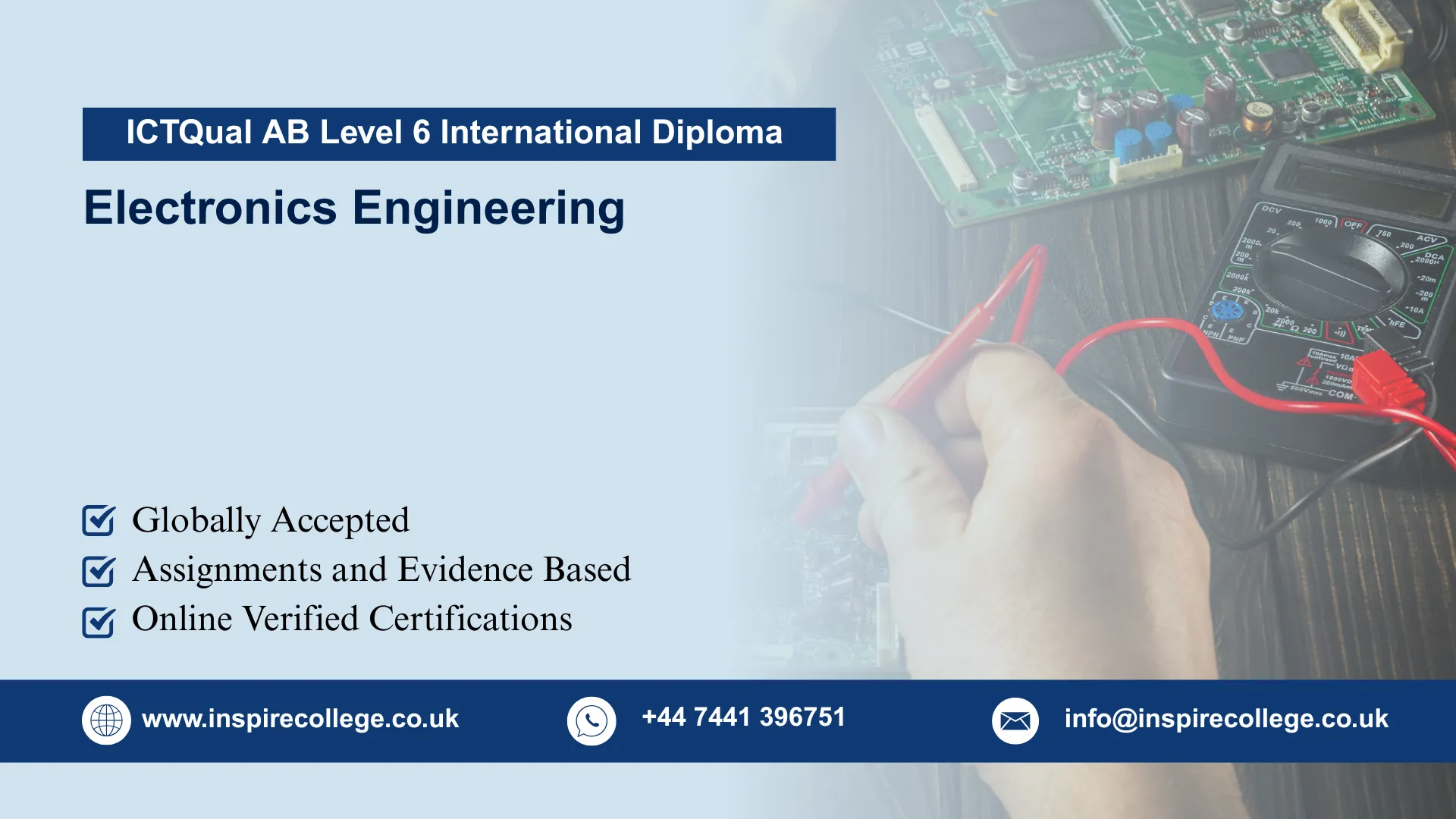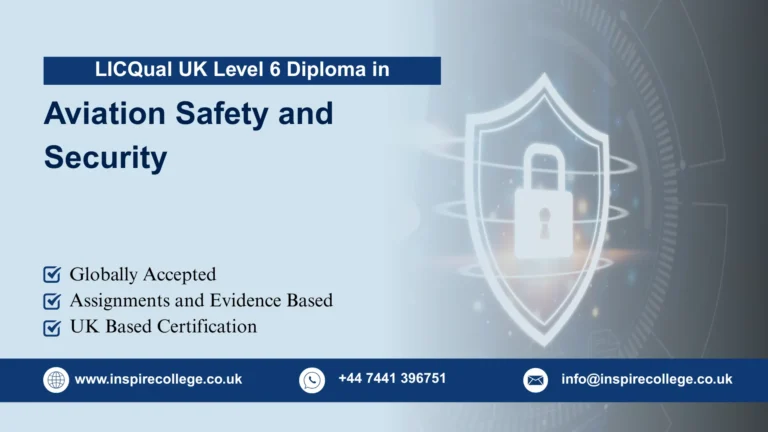
ICTQual AB Level 6 International Diploma in Electronics Engineering
The rapid advancement of technology and the growing demand for skilled professionals in electronics make expertise in this field increasingly vital. The ICTQual AB Level 6 International Diploma in Electronics Engineering is designed to equip learners with comprehensive knowledge, practical skills, and professional competencies required to excel in the electronics industry.
This three-year, 360-credit programme caters to both fresh learners seeking to launch a career in electronics and experienced professionals aiming to enhance their technical expertise. The course provides an in-depth curriculum covering fundamental and advanced concepts in electronics, including circuit design, digital systems, microcontrollers, embedded systems, telecommunications, control systems, and modern electronic applications.
Learners will gain hands-on experience with practical laboratory experiments, simulation software, and project-based learning, enabling them to design, test, and troubleshoot electronic systems effectively. The programme also emphasizes problem-solving, critical thinking, and professional communication skills, preparing graduates to address complex engineering challenges and implement innovative solutions.
Upon successful completion, learners will be prepared for careers in electronics design, telecommunications, automation, embedded systems development, and related engineering roles. Graduates will also possess the skills necessary to manage projects, lead technical teams, and contribute to research and development initiatives. This globally recognized qualification combines theoretical knowledge with applied expertise, empowering learners to become competent electronics engineers capable of driving technological innovation and meeting the demands of a rapidly evolving industry.
To enrol in the ICTQual AB Level 6 International Diploma in Electronics Engineering, learners must meet specific eligibility criteria to ensure they are prepared for this advanced engineering programme. These requirements accommodate both fresh learners and experienced professionals seeking to advance their skills in electronics and related technologies.
Age Requirement
- Learners must be at least 18 years old at the time of enrolment.
Educational Qualifications
- Applicants should hold a Level 5 Diploma, Higher National Diploma (HND), or equivalent in electronics engineering, electrical engineering, or related technical disciplines.
- Fresh learners with strong foundational knowledge in mathematics, physics, or engineering principles may also be considered.
Professional Experience (Optional)
- While not mandatory, learners with 1–2 years of relevant experience in electronics design, telecommunications, automation, or embedded systems are encouraged to apply to enhance practical understanding.
English Language Proficiency
- Learners must demonstrate proficiency in English through IELTS (5.5 or above), TOEFL, or an equivalent recognised qualification.
- This ensures effective engagement with technical materials, assignments, and assessments.
Related Course Option
- Learners interested in complementary expertise may consider the ICTQual AB Level 6 International Diploma in Electrical Engineering, which strengthens knowledge in power systems, control, and industrial applications.
By meeting these entry requirements, learners will be fully prepared to undertake this three-year, 360-credit programme, developing the technical knowledge, practical skills, and professional competencies required to excel as electronics engineers in diverse industries and global markets.
Mandatory Units
This qualification, the ICTQual AB Level 6 International Diploma in Electronics Engineering, consists of 36 mandatory units.
Year 1 – Foundation in Electronics Engineering
- Principles of Electrical and Electronics Engineering
- Introduction to Circuit Theory
- Digital and Analogue Electronics Fundamentals
- Electronic Components and Devices
- Fundamentals of Signal Processing
- Introduction to Microcontrollers and Embedded Systems
- Health, Safety, and Environmental Awareness
- Electrical Measurement and Instrumentation
- Laboratory Techniques in Electronics
- Technical Report Writing
- Introduction to Simulation and Design Software
- Basics of Power Electronics
Year 2 – Intermediate Electronics Engineering
- Advanced Circuit Design and Analysis
- Embedded System Programming
- Communication Systems Fundamentals
- Sensors, Transducers, and Instrumentation
- Power Electronics and Motor Control
- Microprocessor Architecture and Applications
- Process Control and Automation in Electronics
- Data Acquisition and Signal Conditioning
- Project Planning and Technical Communication
- Quality Control and Assurance in Electronics Systems
- Advanced Laboratory Techniques
- Electronics Standards, Safety, and Compliance
Year 3 – Advanced Electronics Engineering
- Advanced Embedded Systems and IoT Applications
- Robotics and Automation Systems
- Advanced Signal Processing Techniques
- Wireless and Telecommunication Systems
- Electronic System Design and Optimisation
- Power Systems and Renewable Integration
- Risk Assessment and Safety in Electronics Projects
- Advanced Laboratory Experiments and Testing
- Supply Chain and Logistics in Electronics Industry
- Capstone Project in Electronics Engineering
- Professional Development and Leadership in Engineering
- Strategic Decision-Making in Electronics Projects
The ICTQual AB Level 6 International Diploma in Electronics Engineering is designed to provide learners with advanced knowledge, practical skills, and professional competencies required to excel in the rapidly evolving electronics industry. This three-year, 360-credit programme ensures learners acquire foundational, intermediate, and advanced capabilities in electronics design, embedded systems, signal processing, automation, and project management.
Year 1 – Foundation in Electronics Engineering
Principles of Electrical and Electronics Engineering
- Explain fundamental concepts of electrical circuits and electronics principles.
- Analyse basic electrical systems for performance and efficiency.
- Apply theoretical knowledge to solve introductory electronics problems.
Introduction to Circuit Theory
- Understand the behavior of electrical circuits using laws and theorems.
- Solve circuit problems with accuracy and critical reasoning.
- Apply circuit analysis techniques in practical scenarios.
Digital and Analogue Electronics Fundamentals
- Differentiate between digital and analogue systems and their applications.
- Analyse basic electronic circuits and signal processing tasks.
- Apply knowledge to design and test simple circuits.
Electronic Components and Devices
- Identify and describe functions of key electronic components.
- Select appropriate components for specific circuit designs.
- Apply component knowledge in laboratory and project work.
Fundamentals of Signal Processing
- Understand basic signal types and processing techniques.
- Analyse signals for noise reduction and optimization.
- Apply signal processing fundamentals in practical electronics projects.
Introduction to Microcontrollers and Embedded Systems
- Understand the architecture and operation of microcontrollers.
- Program simple embedded systems for basic applications.
- Apply microcontroller knowledge in lab-based exercises.
Health, Safety, and Environmental Awareness
- Recognize potential hazards in electronics labs and workplaces.
- Apply safety protocols and environmental standards in practical settings.
Electrical Measurement and Instrumentation
- Operate instruments for voltage, current, and signal measurements.
- Interpret measurement data to evaluate system performance.
- Apply instrumentation skills to enhance circuit testing and diagnostics.
Laboratory Techniques in Electronics
- Conduct experiments safely and systematically.
- Record and analyse experimental data accurately.
- Apply laboratory techniques to reinforce theoretical learning.
Technical Report Writing
- Produce clear and structured technical documentation.
- Communicate complex electronics concepts effectively.
- Apply professional standards in report preparation.
Introduction to Simulation and Design Software
- Operate basic electronic design and simulation tools.
- Analyse simulation outputs for circuit performance.
- Apply software skills to practical electronics projects.
Basics of Power Electronics
- Understand principles of power conversion and control.
- Analyse simple power electronic circuits.
- Apply knowledge in practical lab or project settings.
Year 2 – Intermediate Electronics Engineering
Advanced Circuit Design and Analysis
- Design complex analogue and digital circuits using advanced methods.
- Analyse circuit behavior under varied operating conditions.
- Apply circuit design principles in practical projects.
Embedded System Programming
- Develop software for microcontrollers and embedded systems.
- Implement real-world embedded applications.
- Test and troubleshoot embedded solutions effectively.
Communication Systems Fundamentals
- Understand principles of wired and wireless communication.
- Analyse communication signals and system performance.
- Apply theoretical concepts in practical communication projects.
Sensors, Transducers, and Instrumentation
- Identify and apply different sensors and transducers.
- Integrate instrumentation devices into electronics systems.
- Analyse and interpret sensor data for decision-making.
Power Electronics and Motor Control
- Understand and apply power conversion techniques.
- Analyse motor control systems for industrial applications.
- Implement power electronics concepts in practical projects.
Microprocessor Architecture and Applications
- Describe microprocessor structure and functionality.
- Develop applications using microprocessor-based systems.
- Apply architectural knowledge to optimize embedded designs.
Process Control and Automation in Electronics
- Implement control strategies for automated systems.
- Analyse system performance and optimize operations.
- Apply automation techniques in lab or real-world projects.
Data Acquisition and Signal Conditioning
- Design and implement data acquisition systems.
- Process and condition signals for accurate measurement.
- Apply skills to support electronics testing and research.
Project Planning and Technical Communication
- Plan electronics projects with timelines, resources, and objectives.
- Communicate project outcomes clearly to technical and non-technical audiences.
Quality Control and Assurance in Electronics Systems
- Monitor and evaluate electronics systems for compliance and quality.
- Apply corrective measures and continuous improvement methods.
Advanced Laboratory Techniques
- Conduct complex experiments with precision and safety.
- Analyse results and apply findings to system improvements.
Electronics Standards, Safety, and Compliance
- Understand industry standards, codes, and regulations.
- Apply compliance measures to design and operational tasks.
Year 3 – Advanced Electronics Engineering
Advanced Embedded Systems and IoT Applications
- Develop advanced embedded solutions for IoT devices.
- Integrate sensors and networks for intelligent systems.
- Apply IoT solutions in real-world projects.
Robotics and Automation Systems
- Design and implement robotics control systems.
- Analyse automated processes for efficiency and accuracy.
- Apply robotics knowledge to industrial applications.
Advanced Signal Processing Techniques
- Process complex signals for communication and control.
- Implement filtering, modulation, and analysis techniques.
- Apply signal processing skills in practical projects.
Wireless and Telecommunication Systems
- Understand wireless communication protocols and technologies.
- Analyse system performance and troubleshoot issues.
- Apply knowledge to design practical communication solutions.
Electronic System Design and Optimisation
- Design integrated electronics systems for specific applications.
- Optimise system performance, reliability, and efficiency.
- Apply design and testing skills in projects.
Power Systems and Renewable Integration
- Understand power systems and integration with renewable sources.
- Analyse system efficiency and stability.
- Apply principles to sustainable electronics and energy projects.
Risk Assessment and Safety in Electronics Projects
- Identify hazards and assess risks in electronics operations.
- Implement safety measures and mitigation strategies.
Advanced Laboratory Experiments and Testing
- Conduct sophisticated experiments with accuracy.
- Evaluate system performance and optimise designs.
Supply Chain and Logistics in Electronics Industry
- Understand supply chain operations for electronic components.
- Apply logistics planning to project and industrial contexts.
Capstone Project in Electronics Engineering
- Integrate all learning outcomes into a comprehensive project.
- Demonstrate problem-solving, design, and analytical skills.
- Present findings and project reports professionally.
Professional Development and Leadership in Engineering
- Develop leadership and project management skills.
- Apply professional ethics and standards in engineering practice.
Strategic Decision-Making in Electronics Projects
- Analyse complex engineering scenarios for decision-making.
- Implement strategies to optimise performance and outcomes.
Upon completion of the ICTQual AB Level 6 International Diploma in Electronics Engineering, learners will have gained advanced technical knowledge, practical skills, and professional competencies essential for careers in electronics design, embedded systems, automation, telecommunications, and leadership roles in the global electronics industry.
The ICTQual AB Level 6 International Diploma in Electronics Engineering is designed for learners who are motivated to develop advanced technical expertise and practical skills in electronics, embedded systems, and automation. Ideal candidates are those seeking to build a strong foundation for a career in electronics engineering, telecommunications, or industrial automation.
Ideal Learner Profile
- Has a strong interest in electronics, embedded systems, and automation technologies.
- Is a fresh learner aiming to start a career in electronics engineering or related technical fields.
- Is a working professional seeking to enhance technical expertise, problem-solving skills, and leadership abilities in electronics projects.
- Possesses a background or foundational knowledge in engineering, physics, mathematics, or technology.
- Seeks to develop analytical, design, and troubleshooting skills for complex electronics systems.
- Wants to gain hands-on experience with laboratory experiments, simulation software, and project-based learning.
- Is committed to understanding industry standards, safety protocols, and regulatory compliance.
- Aims to take on roles in electronics design, automation, telecommunications, IoT development, or embedded systems projects.
- Is motivated to advance professional skills and pursue leadership or managerial roles in the electronics industry.
Graduates of this programme will be fully equipped to apply their knowledge and skills in real-world electronics engineering projects, contributing to technological innovation, system optimisation, and professional excellence in global electronics and automation industries.
As an approved ICTQual AB Training Centre, learners must enrol with us to undertake the ICTQual AB Level 6 International Diploma in Electronics Engineering. The programme offers two certification routes to accommodate both experienced professionals and fresh learners, providing flexibility while maintaining international standards.
Certification Route for Experienced Professionals
- Designed for learners with at least 6 years of verifiable professional experience in electronics engineering, automation, embedded systems, telecommunications, or related sectors.
- Learners can leverage their prior work experience to gain recognition for practical competencies.
- Experience-based learners are required to complete selected strategic and project-based assessments, focusing on applied problem-solving, design, and leadership skills.
- This route is ideal for professionals seeking fast-tracked recognition while demonstrating advanced expertise in electronics engineering and project management.
Certification Route for Fresh Learners
- Intended for learners entering the field with little or no prior professional experience.
- Fresh candidates are required to complete all 36 assignments across the programme to demonstrate mastery of theoretical knowledge, practical skills, and project management competencies.
- This route ensures learners develop a comprehensive understanding of electronics systems, embedded applications, automation, and regulatory compliance.
- By completing all assignments, fresh learners meet the same internationally recognized standards expected of professional graduates.
By enrolling with our ICTQual AB Approved Training Centre, all learners gain full access to course materials, expert guidance, and assessment support, ensuring successful completion of the programme. Upon meeting the requirements of their chosen route, learners will be awarded the ICTQual AB Level 6 International Diploma in Electronics Engineering, recognized globally for technical excellence, applied expertise, and professional competence in the electronics industry.
Register Now
FAQs for ICTQual AB Level 6 International Diploma in Electronics Engineering






